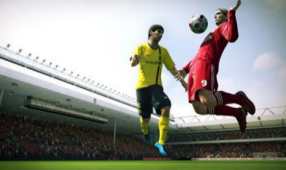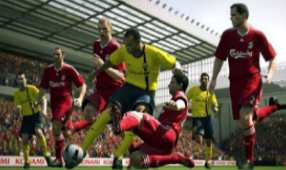| |
 Pro
Evolution Soccer 2010 (Playstation 3) Pro
Evolution Soccer 2010 (Playstation 3)
Konami's long-running soccer series
seems like its fallen a few steps behind FIFA in recent years, but the
developers are looking to change this with Pro Evolution Soccer 2010.
Featuring a new 360 degree movement system, improved visuals and better
AI, the title has undergone a significant revision that improves both its
look and gameplay flow. Additional modes, such as become a legend and
master league add depth, but the smooth on-field gameplay, superb pacing
and fluid matches make for a solid game. Its excellent controls and an
superb interface make this an accessible game and one that should please
hardcore soccer fans, but is this enough to overtake its rival? Look
inside and find out.
|
Konami's Pro Evolution Soccer series has a
long-standing rivalry with EA's FIFA, and while PES had the edge for a
long time, it seems over the past few years, that FIFA's improvements have
surpassed PES. This year, Konami is looking to regain some of its lost
ground and has made some fairly significant changes to PES. The most
important on-field change this year comes in the form of 360 movement for
the players. While this might seem like an incremental change on the
surface, it plays a huge role on how matches unfold. Instead of being
locked in a limited number of directions, you now have many more options
available. You can sneak past defenders, pass through shorter gaps and
dribble with much more precision. Taking this to another level, it also
allows you to perform more accurate shots on goal, because your angles and
shots are far less predictable. Along with this added attacking dexterity,
additional defensive movements also emerge. You can change your defending
momentum, and tackle opponents in more angles, making it much less likely
that aggression will be penalized with a red card. Fortunately, the added
realism doesn't come at the expense of controls, which remain quite simple
to understand and learn, making for a highly-playable and accessible
title. Movement is controlled by the standard left analog stick, and
players can choose to use either the face buttons or the right stick to
pass the ball around. You can choose from several different shots,
including crosses and passes, and press down on the right shift button if
you want to sprint through attackers. Performing tackles is handled with
the circle button, and pressuring rival players is simple enough. It's a
fairly simple interface, but it allows you to change tactics on the fly
without thinking. Players accustomed to previous PES titles won't have to
relearn everything, but the changes make for a logical progression that
won't take long to master.
The games's control configurations work
well together and create a better sense of being on the field. Konami's
developers deserve a lot of credit with these changes, which is especially
true when you get onto the field. PES 2010's new open-ended 360 movement
makes the gameplay feel much more natural and realistic, and does an
excellent job in recreating the feel and flow of a real professional
soccer match. The players feel more realistic and you can see the added
physicality on the pitch, which makes the games feel much grittier than
they have in the past. The computer controlled players show much better
reactions to events, and their increased AI makes them better team-mates
but also harder opponents. Most soccer games to date seem to become too
predetermined, but PES' improved engine makes the gameplay feel more
fluid. This added sense of unpredictability makes playing through each
match feel more kinetic, the ball seems to bounce around randomly and you
have to react to changes on the pitch almost instantly. It feels much
better than last year's edition in a lot of ways, and while its still not
quite as smooth as FIFA, the added sophistication evident in PES goes a
long way towards leveling things out between the franchises in terms of
gameplay.
While the on-field action remains solid
and fluid, PES 10's other modes deserve some attention. The most
interesting of these is the Become a Legend mode. This is kind of like a
soccer role playing game where you can take a professional player from
their beginnings and build up their career until retirement. You begin by
creating a player, then use them in various training matches. You start
with a single training match where your performance as an individual is
ranked. After your first match, you'll get offers from clubs. Select the
club you want to play for than you can try and earn a spot by building up
your skills over several training matches. This gives you opportunities to
become a member of the starting lineup. During your career, you'll have to
make some choices such as which team to play for, whether to take
transfers and other things. Each choice you make can make or ruin your
career. You only have a few years to play before you have to retire, so
you need to choose carefully. For example, playing for a lower-ranked team
makes it easier to play matches, but reduces your potential earnings. This
is a fairly intensive mode, where you have to play many matches before you
make significant progress, but its kind of fun since it offers some
behind-the-scenes action. Among the other modes included in PES 2010,
there's a practice mode that allows you to learn the basic skills you'll
need to play through in real matches. This allows you to configure set
pieces, practice shooting and passing and gives you a good idea of how the
game will flow. It's a good idea to spend plenty of time practicing your
skills here before you head for the Legend and tournament modes, since you
won't be penalized for mistakes.
 If
you want to experience more of what happens off the field, you can also
try the team management mode, called Master League. In this mode, you
decide which players will be on the team's roster, examine their
statistics, make out their training modes, change game plans and
strategies and also have to manage your club's finances. Other tasks
include choosing players from the youth leagues, transferring players,
setting contracts and deciding what to charge for admission. It's a bit
drier than some of the other modes, since most matches can be played
automatically. Its more of a numbers game, and is somewhat challenging
since your progress is charted from week to week. You have to be careful
in how much you charge, since you can't run the risk of alienating your
fans. Another thing you have to watch out for is the club's overall
health, since you can run out of money as well. As the general manager,
you are the one blamed if things go south, and you'll be out of a job if
the team loses too many matches. Its somewhat less interesting than some
of the other modes, and looking at a series of menus makes the Master
League mode feel very much disconnected. Its probably more enjoyable for
the hardcore soccer fans, but most players will probably want to skip it.
However, this is probably the only disappointing section in PES 2010. If
you want to experience more of what happens off the field, you can also
try the team management mode, called Master League. In this mode, you
decide which players will be on the team's roster, examine their
statistics, make out their training modes, change game plans and
strategies and also have to manage your club's finances. Other tasks
include choosing players from the youth leagues, transferring players,
setting contracts and deciding what to charge for admission. It's a bit
drier than some of the other modes, since most matches can be played
automatically. Its more of a numbers game, and is somewhat challenging
since your progress is charted from week to week. You have to be careful
in how much you charge, since you can't run the risk of alienating your
fans. Another thing you have to watch out for is the club's overall
health, since you can run out of money as well. As the general manager,
you are the one blamed if things go south, and you'll be out of a job if
the team loses too many matches. Its somewhat less interesting than some
of the other modes, and looking at a series of menus makes the Master
League mode feel very much disconnected. Its probably more enjoyable for
the hardcore soccer fans, but most players will probably want to skip it.
However, this is probably the only disappointing section in PES 2010.
From a visual standpoint, this
installment of the series marks a huge leap forward in terms of quality
and presentation. While the last few years have seen minor improvements,
this year you can immediately tell that things are different. Despite
lacking the licenses and flash of FIFA, PES still looks solid on the
field. Player models look much more lifelike this time around, with
improved facial expressions and movement showcasing much more detail than
previously. Each player's animation and movement has also been improved to
give them a much more realistic appearance. You can definitely tell them
apart on the field now and they simulate their real-world counterparts
much more realistically. Camera angles look much better and smoother,
particularly the on-field player perspective that allows you to feel like
you're on the pitch and doesn't have the jerkiness that last year's
edition suffered from. Taking a page from other sports titles, the game's
menus have a stylish appearance but remain easy to use and understand. PES
2010's sound effects are also quite good with an impressive roar from the
crowd and extensive in-game commentary adding some flash to the already
solid gameplay mechanics. The game's overall presentation and production
values are excellent, and while its not quite as polished as FIFA's
professional look, the gap is very narrow this year.
One area that might not please hardcore
soccer fans this time around is the game's lack of licenses. This is a
continuing problem that stunts the game since it can only include a few
club teams. PES compensates for this by including the official UEFA
license, which allows you to play through that tournament and other
leagues, but its still annoying to find many of the biggest teams reduced
to generic representations. You can easily tell which teams are which and
their uniform colors are close enough not to matter, but its still
annoying to play as North London instead of Chelsea. Fortunately, the
license restrictions don't apply to the players themselves and you'll find
most of the big names represented this year. While its slightly annoying
that one company enjoys a monopoly on team names, its really not a big
deal once you get onto the field, these are basically labels after all,
and the game is the same no matter what some badge on a jersey says. In
the end, Konami's solid gameplay mechanics and excellent AI overcome this
minor hiccup to make for a solid soccer title that delivers some intense
matches. The new 360 degree movement system is very well implemented,
adding more unpredictability to matches while not drowning players in
complexity. Easily mastered controls allow players to concentrate on the
on-field action without messing around with buttons. The added depth from
the master league and legend modes gives PES 2010 added longevity and
replay value. With its solid gameplay mechanics very much in evidence
throughout, PES 2010 is an excellent installment in the franchise. Despite
these improvements, it still remains a few steps behind FIFA's refined
gameplay in its overall package. While it's a solid second, PES's flaws
mean it doesn't quite overtake its rival this year.
-
Michael Palisano
|
| |
|

